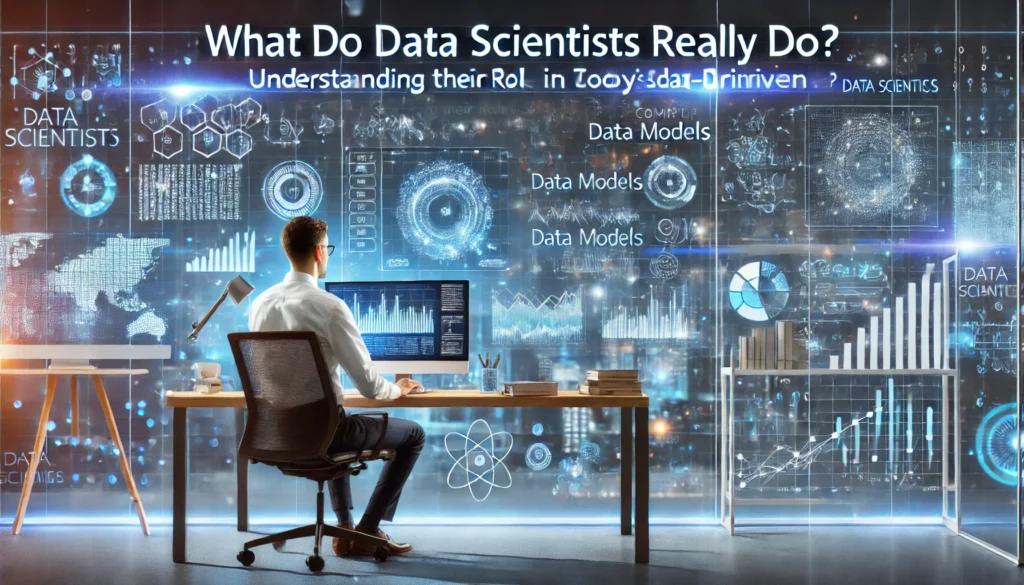
In an era where data is dubbed the “new oil,” data scientists play a pivotal role in extracting value from vast amounts of raw information. They are the masterminds behind the actionable insights that drive decisions in businesses, healthcare, technology, and beyond. But what exactly do data scientists do, and why are they so essential in today’s data-driven world? Let’s explore the responsibilities, skills, and tools that define this dynamic role.
The Core of Data Science: Turning Data into Insights
At its essence, the role of a data scientist revolves around transforming raw data into meaningful insights. This involves:
-
- Data Collection: Sourcing data from various platforms, such as databases, APIs, web scraping, or internal company systems.
-
- Data Cleaning and Preprocessing: Organizing, cleaning, and structuring data to make it usable. Raw data often contains missing values, duplicates, and errors that must be addressed.
-
- Exploratory Data Analysis (EDA): Investigating datasets to uncover trends, patterns, and outliers using statistical and visualization techniques.
-
- Model Development: Using artificial intelligence (AI) and machine learning (ML) to create predictive or descriptive models that address specific business problems.
-
- Insight Communication: Presenting findings to stakeholders in a clear and actionable way, often using data visualization tools.
Tools of the Trade
Data scientists rely on a combination of programming languages, statistical tools, and machine learning frameworks to perform their duties. Some of the most commonly used tools include:
-
- Programming Languages: Python, R, and SQL for data manipulation, analysis, and querying.
-
- Machine Learning Libraries: TensorFlow, scikit-learn, and PyTorch for building and training models.
-
- Visualization Tools: Tableau, Power BI, and Matplotlib for creating dashboards and visual insights.
-
- Big Data Platforms: Apache Spark and Hadoop for processing massive datasets.
Problem-Solving with Mathematical Models
One of the defining aspects of data scientists is their ability to apply advanced mathematics and algorithms to solve real-world problems. For example:
-
- Customer Segmentation: Using clustering algorithms to group customers based on behavior for targeted marketing.
-
- Predictive Analytics: Building models to forecast sales, detect fraud, or anticipate equipment failures.
- Natural Language Processing (NLP): Analyzing text data, such as customer reviews or social media, to extract sentiment and topics.
What Makes Data Scientists Crucial?
Data scientists are invaluable because they bridge the gap between raw data and strategic decision-making. Their work directly impacts:
-
- Business Growth: Identifying new market opportunities and optimizing operations.
-
- Customer Experience: Personalizing products and services to meet customer needs.
-
- Risk Management: Detecting anomalies that signal potential issues like fraud or system failures.
-
- Innovation: Driving breakthroughs in fields like healthcare, autonomous vehicles, and financial technology.
The Skills That Make a Great Data Scientist
Data scientists must balance technical expertise with critical thinking and communication. Key skills include:
-
- Technical Skills: Proficiency in coding, statistical analysis, and machine learning.
-
- Critical Thinking: Asking the right questions and interpreting data in a meaningful way.
-
- Communication: Translating complex analyses into insights that non-technical stakeholders can understand.
-
- Domain Knowledge: Understanding the industry they work in to provide contextually relevant insights.
Real-World Examples of Data Science in Action
-
- Healthcare: Predicting patient readmission risks using AI models trained on historical data.
-
- Retail: Optimizing inventory management by forecasting demand based on trends.
-
- Finance: Identifying fraudulent transactions in real-time through anomaly detection.
The Future of Data Science
As technology advances, the role of a data scientist continues to evolve. Emerging trends such as AI-driven automation and augmented analytics are changing how data scientists work. However, their core focus on problem-solving, innovation, and decision support remains constant.
The Value of a Data Scientist
Data scientists are not just tech-savvy individuals crunching numbers – they are strategic thinkers who drive innovation and efficiency across industries. They combine technical prowess with analytical reasoning to extract insights from data, making them indispensable in today’s world.
If you’re inspired to start your journey in data science, explore our tailored programs designed to equip you with the skills to thrive in this exciting field.
Visit Bictors to learn more!